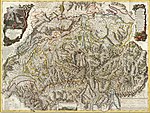| Revision as of 11:44, 7 April 2005 editMegan1967 (talk | contribs)11,849 editsm link edit← Previous edit | Revision as of 10:58, 9 August 2005 edit undoGidonb (talk | contribs)Autopatrolled, Extended confirmed users95,694 edits credits of holocaust victimsNext edit → | ||
| Line 8: | Line 8: | ||
| Nazi Germany drew up plans to invade Switzerland, most notably ']', but the invasions were never carried out. | Nazi Germany drew up plans to invade Switzerland, most notably ']', but the invasions were never carried out. | ||
| The commercial involvement of some Swiss banks with the ] regime, particularly the gold trade of the ] was the object of public attention between ] and ]. The ] estimated that roughly half of the 890 million USD transactions in gold of the German ] was effectuated with the involvement of Swiss banks. Switzerland was accused of violation of neutrality, and prolongation of the war, because of these transactions, with particular vigour by US senator ] and attorney ]. ] officially investigated the charges for the US administration. Dealings in gold with Nazi Germany were seen as particularly immoral because much of the gold in question had been looted from Jews killed in the ]. Switzerland |
The commercial involvement of some Swiss banks with the ] regime, particularly the gold trade of the ] was the object of public attention between ] and ]. The ] estimated that roughly half of the 890 million USD transactions in gold of the German ] was effectuated with the involvement of Swiss banks. Switzerland was accused of violation of neutrality, and prolongation of the war, because of these transactions, with particular vigour by US senator ] and attorney ]. ] officially investigated the charges for the US administration. Dealings in gold with Nazi Germany were seen as particularly immoral because much of the gold in question had been looted from Jews killed in the ]. Switzerland paid reparations to the Allies in ]. In 1997 information released by ] ] reveiled that at least one Swiss bank destroyed records of credits belonging by holocaust victims, which the Swiss banks were demanded to return to their lawful owners. After a Swiss-Jewish organization filed a complaint against the bank, the Swiss authorities reacted with an arrest warrant against the whistleblower. Meili managed to escape to the ] where he was granted political asylum. In ], the Swiss banks settled for the payment of additional reparations of 1.25 billon USD to a special ]. | ||
| ] | ] | ||
Revision as of 10:58, 9 August 2005
| Part of a series on the |
|---|
| History of Switzerland |
 |
| Early history |
| Old Swiss Confederacy |
|
| Transitional period |
|
| Modern history |
|
| Timeline |
| Topical |
|
|
During both World War I and World War II, Switzerland managed to keep a stance of armed neutrality, and was not involved militarily. It was, however, precisely because of its neutral status, of considerable interest to all parties involved, as the scene for diplomacy, espionage, commerce, and as safe haven for refugees. The 1917 Dada movement of Zürich was essentially a cultural reaction to the war, initiated by exiles. Lenin was also exiled in Zürich, from where he travelled directly to Petrograd to lead the Russian Revolution.
In 1920, Switzerland joined the League of Nations.
Nazi Germany drew up plans to invade Switzerland, most notably 'Operation Tannenbaum', but the invasions were never carried out.
The commercial involvement of some Swiss banks with the Nazi regime, particularly the gold trade of the Swiss National Bank was the object of public attention between 1995 and 2000. The Bergier commission estimated that roughly half of the 890 million USD transactions in gold of the German Reichsbank was effectuated with the involvement of Swiss banks. Switzerland was accused of violation of neutrality, and prolongation of the war, because of these transactions, with particular vigour by US senator Alfonse M. D'Amato and attorney Edward Fagan. Stuart Eizenstat officially investigated the charges for the US administration. Dealings in gold with Nazi Germany were seen as particularly immoral because much of the gold in question had been looted from Jews killed in the Holocaust. Switzerland paid reparations to the Allies in 1952. In 1997 information released by whistleblower Christoph Meili reveiled that at least one Swiss bank destroyed records of credits belonging by holocaust victims, which the Swiss banks were demanded to return to their lawful owners. After a Swiss-Jewish organization filed a complaint against the bank, the Swiss authorities reacted with an arrest warrant against the whistleblower. Meili managed to escape to the United States where he was granted political asylum. In 1999, the Swiss banks settled for the payment of additional reparations of 1.25 billon USD to a special Holocaust Fund.
Category: